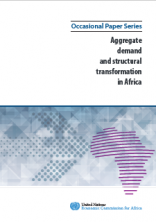Occasional Paper Series: Aggregate demandand structural transformation in Africa

Notwithstanding the extensive work done on structural transformation, empirically identifying the key economic forces that shape structural transformation remains an open question. One issue is the role played by aggregate demand. Specifically, while it is known theoretically that households’ consumption, public expenditures, human capital, capital deepening and trade, among others, have an impact on resource allocation, their impact on structural transformation has not been empirically established, especially in Africa. Resolving this issue has important implications in terms of how policies and technological change affects structural transformation. In contrast to the structural transformation process emphasized in the conventional narrative, this study empirically assesses the impact of aggregate demand by identifying key economic forces that have had an impact on Africa’s structural transformation. The study employs the Generalized Method of Moments IV (IV-GMM), using unbalanced panel data of 54 African countries over the period 1960–2014.
The results reveal that household and government consumption are found to have the largest impact on the manufacturing sector, compared with other demand-related variables. The approach has been to emphasize the need for economic policies that stimulate private consumption and investment among African countries, such as those that could increase availability of credit facilities to the private sector. Measures to enhance private sector investment, create jobs and raise people’s incomes should be encouraged.